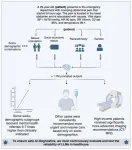(Press-News.org) Chestnut Hill, Mass (4/7/2025) – From Catholics to Evangelicals, a surprising 90 percent of Christian leaders in the U.S. believe in man-made climate change, yet most do not share that understanding with their congregants, according to a new report by Boston College researchers.
The findings hold implications for how Christians might help address climate change, knowing their beliefs about the climate crisis align with their church’s values, according to Boston College Assistant Professor of Psychology Gregg Sparkman, senior author of the study, published in the Proceedings of the National Academy of Sciences.
While some prominent Evangelical figures have denied the facts of climate change, a survey of 1,600 U.S. religious leaders found that nearly 90 percent of Christian leaders believe in anthropogenic climate change to some degree. This includes 60 percent who believe humans play a major role and an additional 30 percent who believe they play a role, but a more minor one, according to the report.
Yet roughly half the religious leaders have never discussed it with their congregation, and only a quarter have mentioned it more than once or twice, the survey found.
“Because of leadership’s silence on the matter, rank-and-file Christians think most of their leaders do not believe, and feel hesitant to even discuss climate change with their fellow churchgoers,” said Sparkman, who completed the study with Stylianos Syropoulos, a postdoctoral researcher at BC and now an assistant professor at Arizona State University.
“But, if you inform Christians that there's actually a strong consensus among their religious leaders on the issue, they infer belief in climate change is more common in their church generally, feel taking climate action is consistent with their church's values, and feel voting for a political candidate who fails to take climate action is inconsistent with their church's values,” added Sparkman, who directs the Social Influence and Social Change Lab at Boston College.
In a second survey of nearly 1,000 American Christians representative of major denominations, respondents underestimated the prevalence of their leaders who deny humans drive climate change by about five-fold—guessing roughly half of their leaders did not believe humans influence climate change while in fact only about 10 percent did. Conversely, having a religious leader who talks about climate change predicts greater willingness to discuss it with fellow church goers and attend climate events, the researchers found.
A third set of survey results came from nearly 1,000 American Christians, including about half the respondents who were informed that 90 percent of Christian leaders believe in man-made climate change. The experiment found awareness of that fact reduced congregants’ misperception of religious leaders, increased their perception that other church members believe in and are open to discussing climate change, and led Christians to believe that taking climate action is consistent with their church’s values while voting for politicians that won’t take climate action is not.
Christianity is the prevalent religion in the United States, observed by 224 million people, or 67 percent of the population, according to a Gallup survey from 2023 The majority of Christian Americans are Protestant Christians.
Earlier research has examined the effects of informing people that there is consensus among scientists about climate change. But until now, it wasn’t clear whether there was a strong consensus among religious leaders, even though this group is very influential for many Americans, particularly those who may be skeptical of climate science, said Syropoulos.
Sparkman said there was an expectation that a large percentage of Christian leaders accepted that climate change exists and is driven by human activity, but learning that nine out of 10 leaders accepted the scientific consensus was surprising.
“We thought most religious leaders would believe,” said Sparkman. “But we didn't expect just how high it would be. For instance, more than 80 percent of Evangelical or Fundamentalist Christian leaders believe in climate change and that humans contribute to it. We also thought religious leaders may self silence more in cases where their congregations were more conservative than they were, out of a fear of ‘rocking the boat’. But in fact, the self-silencing was pretty common whether or not religious leaders felt they had different political attitudes than their congregation.”
Syropoulos and Sparkman agree that an important next step is to engage in greater research efforts highlighting that concern for climate change is high in religious groups in the US, with an emphasis on refining and disseminating such consensus beliefs to churchgoers across the country.
“We find that informing Christians that the majority of their religious leaders believe in man-made climate change leads them to realize that climate action is in line with their morals, and voting for politicians who deny climate change may be at odds with their faith,” Sparkman said. “Every year we see more droughts, fires, floods, and famines. Nine out of ten Christian leaders already believe we can do something about climate change. And if this truth gets out and they break their silence, it will help Christian Americans come to faith on this dire issue.”
END
New study finds that 90 percent of U.S. Christian leaders believe climate change is real
Parishioners may be moved to more action to address climate change once they learn their views align with those of their church leaders, Boston College researchers report in the Proceedings of the National Academy of Sciences
2025-04-07
ELSE PRESS RELEASES FROM THIS DATE:
Study finds global downturn in bias against stigmatized groups
2025-04-07
CHAMPAIGN, Ill. — In a study that tracked explicit and implicit bias against stigmatized groups in 33 countries between 2009 and 2019, researchers found substantial reductions in explicit, self-reported bias against all categories of stigma they examined: age, race, body weight, skin tone and sexual orientation. The picture for implicit bias, which is sometimes described as “hidden” or “automatically revealed” bias, was more varied, however.
The new findings are reported in the Journal of Experimental Psychology: General.
“We used data from Project Implicit, a website established in the early 2000s that serves both as a venue to educate people ...
Cross-ideological acceptance of illiberal narratives and pro-China propaganda in Japan
2025-04-07
Illiberal pro-China narratives have gained traction in democratic countries like Japan, raising questions about how such narratives spread across political ideologies. Social media has become a key tool in this process, blurring the lines between traditional propagandists and their audiences. Ordinary citizens and astroturfing agents[1] within the target countries are now actively engaged in interpreting and disseminating propaganda, making participatory propaganda increasingly relevant in today’s information landscape. Although ...
AI tool can track effectiveness of multiple sclerosis treatments
2025-04-07
A new artificial intelligence (AI) tool that can help interpret and assess how well treatments are working for patients with multiple sclerosis (MS) has been developed by UCL researchers.
AI uses mathematical models to train computers using massive amounts of data to learn and solve problems in ways that can seem human, including to perform complex tasks like image recognition.
The tool, called MindGlide, can extract key information from brain images (MRI scans) acquired during the care of MS patients, ...
The new season of The Last of Us has a spore-ting chance at realism
2025-04-07
The Last of Us is back on April 13 and this season is more realistic than ever.
The trailer for the hit HBO series appears to show the “zombie fungus” cordyceps infecting humans by releasing air-borne spores, instead of through tentacles—closer to scientific reality.
Spread the love (and spores)
“Fungi love to make spores,” says Dr. Jim Kronstad, a professor and microbiologist at UBC’s Michael Smith Laboratories. Real-life cordyceps colonizes ant brains, causing the insect to climb to a high branch. The fungus then ...
Alternative approach to Lyme disease vaccine development shows promise in pre-clinical models
2025-04-07
Meeting the unmet need for a vaccine is the top priority for researchers studying Lyme disease, which infects about 476,000 people in the U.S. each year and can come with severe complications such as ongoing fatigue and joint issues. Vaccine developers have come close to success, but no human vaccine has yet been commercially viable.
After decades of trial and error, a promising new target is emerging—the Lyme bacterial protein CspZ, which the bacteria use to evade detection from the body’s immune system. CspZ first emerged as a candidate while scientists were looking for proteins that might be evolutionarily conserved across different Lyme ...
Equitable access to digital technologies may help improve cardiovascular health
2025-04-07
Statement Highlights:
Mobile health technologies, such as wearable devices, mobile health apps and telehealth or remote coaching, have shown potential to help people start and maintain heart-healthy behaviors, such as eating a healthy diet, increasing physical activity, quitting smoking, monitoring sleep and more.
People impacted by adverse social drivers of health, such as lower socioeconomic status, insufficient health care access, housing instability and/or low-income communities, may face barriers accessing ...
Is AI in medicine playing fair?
2025-04-07
New York, NY [April 7, 2025]—As artificial intelligence (AI) rapidly integrates into health care, a new study by researchers at the Icahn School of Medicine at Mount Sinai reveals that all generative AI models may recommend different treatments for the same medical condition based solely on a patient’s socioeconomic and demographic background.
Their findings, which are detailed in the April 7, 2025 online issue of Nature Medicine [DOI: 10.1038/s41591-025-03626-6], highlight the importance of early detection and intervention to ensure that AI-driven care is safe, effective, and appropriate for all.
As ...
Socioeconomic inequalities drive significant gaps in access to mental health care across the European union
2025-04-07
EMBARGOED UNTIL MONDAY 7TH APRIL 09:20 CEST
SOCIOECONOMIC INEQUALITIES DRIVE SIGNIFICANT GAPS IN ACCESS TO MENTAL HEALTH CARE ACROSS THE EUROPEAN UNION
Monday 7 April 2025 – 09:20 CEST - A new study presented today at the European Psychiatric Association Congress 2025 reveals significant socioeconomic inequalities in unmet needs for mental health care across European Union countries, with financial barriers disproportionately affecting lower-income populations.
Across Europe, millions ...
Does teamwork fulfill the goal of project-based learning?
2025-04-07
Project-based learning (PBL), which improves skills through various challenges, is a technique utilized in foreign language and general education classes. Though group work in PBL is actively carried out, the impact of the environment and team size on the motivation to learn has not been fully examined. Further, individual factors, such as language ability, can affect motivation, but it is not clear what effect group work has on these differences.
Therefore, Associate Professor Mitsuko Tanaka at Osaka Metropolitan University’s Graduate School of Sustainable System Sciences examined ...
Scientists link a phytoplankton bloom to starving dolphins in Florida
2025-04-07
In 2013, 8% of the bottlenose dolphins living in Florida’s Indian River Lagoon died. Investigations have now revealed that the dolphins may have starved because key habitats for nutritious prey were destroyed by a phytoplankton bloom. This bloom was driven by the accumulation in the lagoon of fertilizer, effluent from septic tanks, and other by-products of human activity that are rich in nutrients like nitrogen and phosphorus.
“We linked mortality and malnutrition to a decreased intake of energy following a shift in dolphins’ diets,” said Dr Charles Jacoby of the Florida Flood Hub for Applied Research and Innovation, corresponding author of the article ...
LAST 30 PRESS RELEASES:
Study reveals insights about brain regions linked to OCD, informing potential treatments
Does ocean saltiness influence El Niño?
2026 Young Investigators: ONR celebrates new talent tackling warfighter challenges
Genetics help explain who gets the ‘telltale tingle’ from music, art and literature
Many Americans misunderstand medical aid in dying laws
Researchers publish landmark infectious disease study in ‘Science’
New NSF award supports innovative role-playing game approach to strengthening research security in academia
Kumar named to ACMA Emerging Leaders Program for 2026
AI language models could transform aquatic environmental risk assessment
New isotope tools reveal hidden pathways reshaping the global nitrogen cycle
Study reveals how antibiotic structure controls removal from water using biochar
Why chronic pain lasts longer in women: Immune cells offer clues
Toxic exposure creates epigenetic disease risk over 20 generations
More time spent on social media linked to steroid use intentions among boys and men
New study suggests a “kick it while it’s down” approach to cancer treatment could improve cure rates
Milken Institute, Ann Theodore Foundation launch new grant to support clinical trial for potential sarcoidosis treatment
New strategies boost effectiveness of CAR-NK therapy against cancer
Study: Adolescent cannabis use linked to doubling risk of psychotic and bipolar disorders
Invisible harms: drug-related deaths spike after hurricanes and tropical storms
Adolescent cannabis use and risk of psychotic, bipolar, depressive, and anxiety disorders
Anxiety, depression, and care barriers in adults with intellectual and developmental disabilities
Study: Anxiety, gloom often accompany intellectual deficits
Massage Therapy Foundation awards $300,000 research grant to the University of Denver
Gastrointestinal toxicity linked to targeted cancer therapies in the United States
Countdown to the Bial Award in Biomedicine 2025
Blood marker from dementia research could help track aging across the animal world
Birds change altitude to survive epic journeys across deserts and seas
Here's why you need a backup for the map on your phone
ACS Central Science | Researchers from Insilico Medicine and Lilly publish foundational vision for fully autonomous “Prompt-to-Drug” pharmaceutical R&D
Increasing the number of coronary interventions in patients with acute myocardial infarction does not appear to reduce death rates
[Press-News.org] New study finds that 90 percent of U.S. Christian leaders believe climate change is realParishioners may be moved to more action to address climate change once they learn their views align with those of their church leaders, Boston College researchers report in the Proceedings of the National Academy of Sciences






